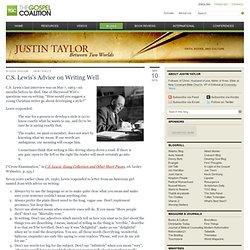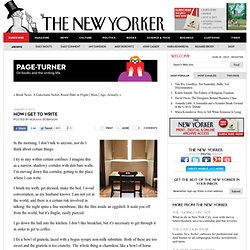

C.S. Lewis’s Advice on Writing Well. C.S.

Lewis’s last interview was on May 7, 1963—six months before he died. One of Sherwood Wirt’s questions was on writing: “How would you suggest a young Christian writer go about developing a style?” Lewis responded: The way for a person to develop a style is (a) to know exactly what he wants to say, and (b) to be sure he is saying exactly that.The reader, we must remember, does not start by knowing what we mean. If our words are ambiguous, our meaning will escape him.I sometimes think that writing is like driving sheep down a road. (“Cross-Examination,” in C.S. Seven years earlier (June 26, 1956), Lewis responded to letter from an American girl named Joan with advice on writing: Always try to use the language so as to make quite clear what you mean and make sure your sentence couldn’t mean anything else.Always prefer the plain direct word to the long, vague one.
(C.S. Copyright © 2014 by the author listed above. Works - Tales - The Philosophy of Composition [Text-02] [page 163, full page:] CHARLES DICKENS, in a note now lying before me, alluding to an examination I once made of the mechanism of “Barnaby Rudge,” says — “By the way, are you aware that Godwin wrote his ‘Caleb Williams’ backwards?
![Works - Tales - The Philosophy of Composition [Text-02]](http://cdn.pearltrees.com/s/pic/th/philosophy-composition-49789453)
He first involved his hero in a web of difficulties, forming the second volume, and then, for the first, cast about him for some mode of accounting for what had been done.” I cannot think this the precise mode of procedure on the part of Godwin — and indeed what he himself acknowledges, is not altogether in accordance with Mr. Dickens’ idea — but the author of “Caleb Williams” was too good an artist not to perceive the advantage derivable from at least a somewhat similar process.
Nothing is more clear than that every plot, worth the name, must be elaborated to its dénouement before any thing be attempted with the pen. The Single Most Powerful Writing Tool You’ll Ever See That Fits. And now for the continuing run of yesterday’s milestone post: A bold claim, that. But I challenge you to read this stuff — which, when printed, really does fit onto one page — and then argue that you’ve seen a more empowering checklist of must-haves gathered in such a condensed space.
Blog Archive » Losing the plot, and finding it again. ‘I have a great story, but I can’t seem to write it down.’

‘I want to be a writer but I can never finish anything.’ ‘I’m OK at starting a book, but I get bogged down in the middle.’ I’ve lost count of the times I’ve heard the above from aspiring writers. Common problems are: - keeping control of the story - maintaining pace - holding it all together - finishing It often emerges that the writer has a story but not a plot. A story is not the same as a plot: A plot is the plan or structure you use to tell your story effectively. Both planners and pantsers need to plot. The more complex the story, the more carefully you need to plot: A linear story with a single thread may be relatively easy to plot. Each plot thread should make sense in itself and interweave with the others, not only convincingly, but in the most effective way for this kind of book. Wordplay: Helping Writers Become Authors. On Writing in the Morning. In the morning, I don’t talk to anyone, nor do I think about certain things.

I try to stay within certain confines. 1330746369_Screenshot.jpg (JPEG Image, 373x664 pixels) - Scaled (97%) 25 Things Writers Should Stop Doing. I read this cool article last week — “30 Things To Stop Doing To Yourself” — and I thought, hey, heeeey, that’s interesting.

Writers might could use their own version of that. So, I started to cobble one together. And, of course, as most of these writing-related posts become, it ended up that for the most part I’m sitting here in the blog yelling at myself first and foremost. That is, then, how you should read this: me, yelling at me. If you take away something from it, though? Then go forth and kick your writing year in the teeth. The Daily Routines of Famous Writers.
By Maria Popova UPDATE: These daily routines have now been adapted into a labor-of-love visualization of writers’ sleep habits vs. literary productivity.

Kurt Vonnegut’s recently published daily routine made we wonder how other beloved writers organized their days. So I pored through various old diaries and interviews — many from the fantastic Paris Review archives — and culled a handful of writing routines from some of my favorite authors. Enjoy. Ray Bradbury, a lifelong proponent of working with joy and an avid champion of public libraries, playfully defies the question of routines in this 2010 interview: